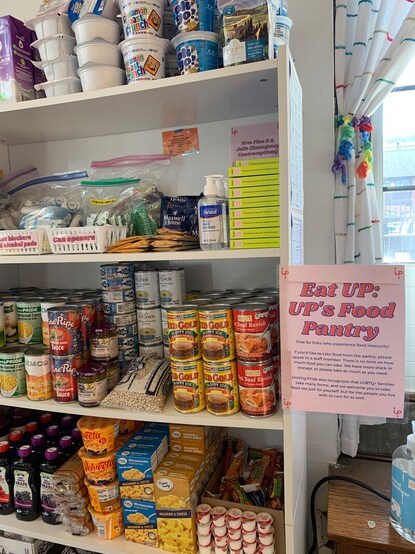Why Supporting Your Local Food Pantry Is Vital for Assisting Those in Requirement
The value of supporting neighborhood food cupboards can not be overstated, specifically in the context of food insecurity, which affects a startling number of individuals and households within our areas. As we explore the multifaceted function of food cupboards, it comes to be evident that their influence extends much past merely dispersing food.
Recognizing Food Instability
Food insecurity impacts about 10.5% of families in the United States, illustrating a considerable public health problem that transcends plain cravings. It refers to the lack of constant accessibility to sufficient food for an energetic, healthy and balanced life. This problem can lead to a variety of unfavorable results, consisting of bad wellness, enhanced healthcare costs, and decreased academic efficiency amongst children.
The reasons of food insecurity are diverse, usually stemming from economic variables such as underemployment, destitution, and joblessness. Geographic area can likewise play a crucial function, with food deserts-- locations with limited accessibility to nutritious and affordable food-- worsening the issue - Food Pantry Lockhart. Furthermore, systemic elements, including racial and social inequities, contribute to the disproportionate influence of food instability on marginalized communities
Resolving food insecurity is not merely concerning increasing food supply; it requires a comprehensive technique that encompasses financial security, education and learning, and neighborhood support. Food instability not just impacts individual well-being yet likewise has broader implications for social health and productivity. Recognizing its complexity is vital for creating efficient interventions and cultivating long-term solutions that guarantee all people have reliable accessibility to nourishing food.
The Role of Food Pantries
Regional food cupboards act as critical lifelines for families and individuals facing food instability. They offer vital food items to those that might battle to manage appropriate nutrition as a result of economic difficulty, joblessness, or unforeseen circumstances. By dispersing food at no charge, these companies aid reduce appetite and protect against the negative health and wellness impacts connected with poor diet plans.
Food pantries typically partner with neighborhood ranches, food store, and community organizations to source a range of nourishing food items, consisting of fresh produce, dairy products, and proteins. This collaboration makes certain that pantry customers get not only nourishment yet also much healthier choices that add to overall health.
In addition, food pantries work as area centers, cultivating links amongst citizens and offering a feeling of self-respect to those in requirement. Several pantries use extra resources, such as nourishment education and references to social solutions, aiding clients browse their obstacles extra successfully.
Basically, food kitchens play a multifaceted function in combating food instability. They not only address prompt hunger but also empower individuals and households to boost their conditions, thus advertising community durability and communication.

Advantages of Supporting Food Pantries

Supporting food cupboards not only nurtures those in need however likewise reinforces the fabric of the community. By giving vital food resources, food pantries reduce cravings and minimize food insecurity, which is important for the health and health of family members and people. Accessibility to healthy food adds to enhanced physical health and wellness, far better educational end results for kids, and improved psychological health and wellness, consequently cultivating a much more productive and engaged neighborhood.
Furthermore, supporting food cupboards advertises social communication. These companies function as hubs for neighborhood engagement, uniting volunteers, donors, Web Site and recipients in a common objective to battle cravings. This collaboration can break down barriers, foster understanding, and construct partnerships amongst varied neighborhood members.
Furthermore, contributions to food pantries, whether in the type of food, funds, or time, stimulate the neighborhood economic climate. Lots of food pantries prioritize sourcing from neighborhood producers, therefore sustaining neighborhood farming and organizations. This produces a cycle of support that benefits not only those in demand yet the community overall.
How to Get Included
Involvement with food kitchens can take many kinds, permitting teams and individuals to make a significant effect in their areas. Monetary contributions are additionally vital, as they make it possible for food cupboards to buy fresh produce and essential supplies.
Volunteering your time is another impactful way to support regional food cupboards (Food Pantry Lockhart). In addition, think about organizing food drives within your institution, workplace, or community group to elevate awareness and collect sources.
Partnerships with regional businesses can even more boost assistance for food kitchens. By taking these groups, actions useful source and individuals can significantly reinforce the efforts of neighborhood food kitchens and assist those in demand.
Neighborhood Influence and Link
Acknowledging the profound influence of food kitchens on community health is crucial for fostering a spirit of connection and collaboration. Food pantries serve not just as vital resources for those facing food insecurity but additionally as hubs for neighborhood interaction. They unite varied teams-- volunteers, customers, and benefactors-- developing an atmosphere where people can sustain and connect each other.
The impact of food cupboards extends past simple stipulation of food; they act as a stimulant for social cohesion. By joining pantry initiatives, area members can create relationships that go beyond socioeconomic barriers. This network of assistance helps to take apart the preconception usually connected with food assistance, cultivating an atmosphere of acceptance and understanding.
As individuals unite in their initiatives to sustain regional food pantries, they grow a sense of common function and duty, enhancing the idea that everyone you could try these out has a duty to play in making sure that no one goes hungry. Ultimately, supporting food cupboards reinforces the material of the community as a whole.
Verdict
Supporting regional food kitchens is vital in combating food insecurity and boosting the wellness of at risk populations. Engagement with food kitchens cultivates area links, promoting social cohesion and equity.
:strip_icc()/Food-storage-containers-Joyelle_171012_013-1-6C4jblSM4qy9l-4M2BZPx--320301047ce840eb9434a51fc0f9860a.jpg)